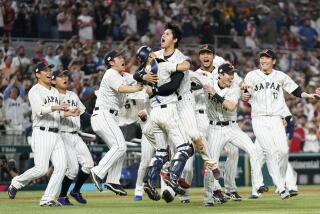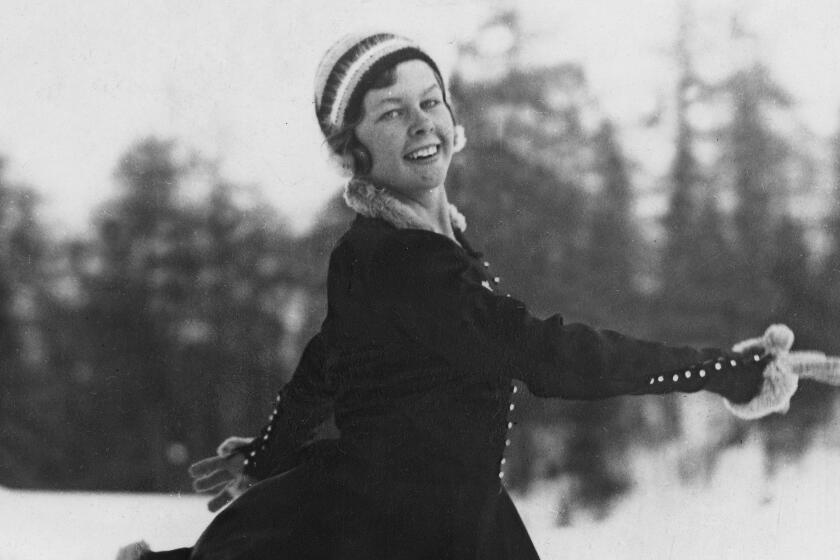THE ISSUE OF PROS IN OLYMPICS : As Debate Persists, Sports Such as Hockey Weigh Aspects of a Gretzky in the Games
The International Olympic Committee wants Wayne Gretzky to play in Calgary’s 1988 Olympic Winter Games.
West Germany’s Gunther Sabetzki, the president of the International Ice Hockey Federation (IIHF), wants Gretzky to play in the Olympics.
Murray Costello, the president of the Canadian Amateur Hockey Assn. (CAHA), wants Gretzky to play in the Olympics.
The vote, however, is far from unanimous.
Who is opposed?
Gretzky, for one.
But even if he did want to play, his employers, the Edmonton Oilers, almost certainly would object, considering that the Calgary Olympics, scheduled for Feb. 13-28, will be held in the middle of the National Hockey League’s season.
Not even Costello would argue that decision with Oiler owner Peter Pocklington.
“If I were the Oilers’ owner, I wouldn’t let my meal ticket get more than two blocks away,” Costello said.
Pocklington may be spared having to decide.
Even though Sabetzki favors allowing all professionals into the Olympics, early indications are that the proposal will be rejected by IIHF representatives next April at Vienna.
Led by the United States and the Soviet Union, who for different reasons find themselves on the same side of the professionalism issue more often than not, 22 of the 36 IIHF members signed a petition critical of the proposal at this year’s meeting in Colorado Springs, Colo.
If the proposal passes, it will be only because of Sabetzki’s considerable influence.
“Our international president is for it, but I’ve never figured out why,” said Hal Trumble, executive director of the Amateur Hockey Assn. of the United States (AHAUS).
“It bothers us (IIHF members) that he doesn’t express the feelings of the majority. I’m sure that will be a subject for discussion in Vienna.”
Whether to allow all professionals into the Olympics has been controversial since the 1984 Winter Games at Sarajevo, Yugoslavia. The debate continued almost until the opening face-off before the IOC ruled that the competition was open to everyone except players who had participated in 10 or more NHL games. Even though they are professionals, American Hockey League players were eligible. So were those who had played in the old World Hockey Assn., surviving teams of which were absorbed by the NHL.
“The IOC misinterpreted the way the old rule read,” Trumble said. “The old rule said that anyone who has signed a professional contract is ineligible. The IOC said AHL players were not professional, even though they and NHL players sign identical contracts. Why is one professional and the other not?”
Having no credible answer to that question, the IOC responded in Lausanne, Switzerland, this fall by declaring that the IIHF could set its own eligibility standards, including opening the Olympics to NHL players.
The IOC cannot tell the IIHF which course to take, but the chairman of the IOC’s eligibility committee, West Germany’s Willi Daume, made it apparent that he believes the Olympics should be open to the best athletes, professional or not.
That position also is supported by IOC President Juan Antonio Samaranch, who has said that Western countries should be able to use professional athletes to compete against the Eastern Bloc’s state-supported athletes.
The IOC’s resolution passed without dissent from Eastern Bloc members, including two representatives from the Soviet Union.
One theory is that the Soviets believe they can win in Calgary even if Canada and the United States use NHL players.
The Soviets, historically, have had success against NHL All-Star teams, especially when the NHL players were not allowed much time to work out together.
But Trumble said the Eastern Bloc countries probably have decided to fight the proposal at the IIHF level.
“Unless, for reasons that I don’t know anything about, a lot of members change their minds, the proposal’s going to lose in Vienna,” Trumble said. “I think we’ll stay with the same eligibility rule we had in ‘84, although I wouldn’t have any objection to making former NHL players eligible.”
Trumble said the proposal’s only significant supporter is Canada, which has the most to gain if it is adopted.
“If we were in their situation, I might feel the same way,” Trumble said. “But we have strong high school and college programs, which they don’t.”
Most of Canada’s outstanding young players turn professional in their teens, before they are ever involved with the Olympic program.
Perhaps it is wishful thinking, but Costello of the CAHA said he believes that Sabetzki will prevail and the proposal will pass.
But he is realistic about the possibility of getting Gretzky or any of the other NHL stars into Canadian Olympic uniforms.
“There is a great deal of difference in eligibility and availability,” Costello said. “The prudent approach is to assume it’s not going to happen.”
From his conversations with NHL general managers, Trumble said he believes they would not allow the best players to participate in the Olympics.
“They say they might give us players who are having trouble getting ice time in the NHL,” Trumble said. “But even then, we probably wouldn’t get them until a week or two before the Olympics. I would rather have our college players.”
Costello said Canada also can do without that kind of support from the NHL.
“Of course, we could never turn down a Gretzky,” he said. “But outside of him and three or four other players, I think we’d be better off putting together a group of young players and having them play as a team for three to six months.”
Could Gretzky turn down the Olympics?
His manager, Mike Barnett, said it is unlikely Gretzky would play in the Olympics, even if the IIHF allowed it.
“First and foremost, his obligation is to Peter Pocklington and the Edmonton Oilers,” Barnett said. “I’d be very surprised if any team gives it players carte blanche to play in the Olympics.”
Even if the CAHA bought short-term insurance to compensate the team and the player in case of a career-ending injury to, say, Gretzky, Barnett said the Oilers would disapprove.
“You can’t replace the value of an All-Star talent with an insurance policy, no matter how much it’s worth,” he said.
Assuming for a moment that the Oilers did allow Gretzky to play in the Olympics, Barnett said the next objection might come from his client.
“The NHL is playing two all-star games against the Russians in February,” he said. “There’s the Canada Cup in the summer of ’87. Add the Olympics in February of ‘88, and you have three major international competitions on top of his regular 90-game schedule. That’s likely to be too much hockey over a 2 1/2-year period.
“There’s not that much incentive for Wayne to play. For a professional hockey player from Canada, beating the Russians is not the be all and end all. Winning the Stanley Cup is.”
Besides, Barnett said, Gretzky would be reluctant to take the position on the Canadian Olympic team of a younger player who has been training for the opportunity to play in Calgary.
“There’s a number of kids who have been together for the last three or four years with every hope of representing Canada in ‘88,” he said. “It would hardly be fair for NHL players to come in a week before the Games and take those kids’ places.”
That also is one of Trumble’s objections to the proposal. He said AHAUS would not allow professionals to play for the United States unless they go through the same selection process, training camp and six-month exhibition schedule as the amateurs.
“We will not take players who have been with us for six months and drop them from the team at the last minute to make room for professionals,” Trumble said.
“I don’t buy that the Olympics should be for the best players in the world. I think it should be for the youth of the world.
“In 1980, six players from that team that won the gold medal never went on to professional hockey. If we had used professionals that year, those six never would have had that chance in the Olympics.
“If we used NHL players, it might help us beat the Soviets again in ‘88, but if it comes at the expense of our kids in amateur hockey, the price of gold is too high.”
More to Read
Go beyond the scoreboard
Get the latest on L.A.'s teams in the daily Sports Report newsletter.
You may occasionally receive promotional content from the Los Angeles Times.







